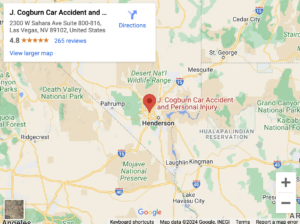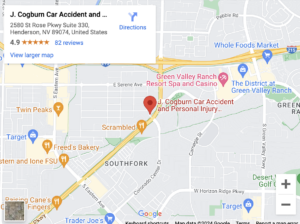
When you have been injured due to someone else’s negligence, the physical and emotional toll can be overwhelming. Pain and suffering damages are intended to compensate you for these non-economic losses without financial value. But how exactly are these damages calculated?
Assigning a value to the emotional and physical suffering and anguish you experienced after an accident is not easy. However, it’s the most practical way for the legal system to compensate you, even though it’s flawed.
Here’s how our Las Vegas personal injury lawyers and insurance companies calculate how much your pain and suffering damages are worth.
What Are Pain and Suffering Damages?

When someone else causes you injury through negligence or intentional wrongdoing, you have the right to seek personal injury damages to be made whole. Special or economic damages compensate for financial losses you suffered, like medical bills. General or non-economic damages compensate for the emotional, psychological, and physical impact of your injuries.
Pain and suffering fall under non-economic damages. The concept refers to the emotional and physical discomfort, pain, and anguish following a serious injury. Sometimes, the value of this suffering exceeds the financial damages in your case, particularly if you are facing long-term pain and hardship.
Physical Pain and Suffering
The physical pain from a serious accident can be intense and debilitating. The injuries themselves may be painful, but you may face difficult medical procedures and a long, challenging recovery. For many victims of a car accident or serious fall, chronic pain, impairment, and limited mobility become a part of daily life.
Examples of physical injuries and ongoing pain that qualify for this type of compensation include:
- Brain injuries
- Back pain
- Organ damage
- Nerve damage
- Spinal cord injuries and paralysis
- Burns
- Amputation
The value of your pain and suffering will depend on the severity and type of injuries you suffered, among other factors.
Emotional Pain and Suffering
Pain and suffering go beyond just physical pain; they also include the emotional and psychological effects of your injuries. Your injuries, the impact on your life, and even the accident itself can have a devastating psychological impact.
Emotional pain and suffering refer to the consequences of your accident, including:
- Emotional distress
- Mental anguish
- Reduced quality of life
- Disfigurement
- Hardship
- Cognitive changes
- Insomnia
- Anxiety
- Depression
- Fear
- Post-traumatic stress disorder (PTSD)
A serious accident can change your life forever, forcing you to come to terms with profound losses and a new trajectory to your life you did not choose.
Loss of Consortium
This is a unique type of pain and suffering. Nevada recognizes an accident can affect more than just the victim. Spouses of personal injury victims may be entitled to compensation for loss of consortium through a separate but derivative lawsuit.
A loss of consortium claim by a spouse seeks compensation for:
- Loss of moral support, love, affection, and companionship
- Loss of care, protection, and assistance
- Loss of financial contributions and help with household chores and childrearing
- Inability to engage in sexual relations or bear children
Only legally married spouses or domestic partners can seek loss of consortium damages. Because these claims are made through a derivative lawsuit, the injured spouse must also sue and win their case to recover compensation.
How Are Pain and Suffering Damages Calculated in Nevada?
Calculating the value of your pain and suffering is complex. There are many factors that should be considered to even estimate these losses, such as:
- Type of injuries you sustained
- Your long-term prognosis
- What your life was like before your accident
- How your injuries affect your daily life
- Whether you can return to work
- Circumstances of the accident and the defendant’s behavior
- Whether you share liability for the accident
- Insurance coverage available for your claim
Sometimes, personal injury lawyers and insurance adjusters use a basic formula as a starting point for negotiations.
The multiplier method is a common method used by insurance companies and attorneys. After calculating your economic damages, the amount is multiplied by a number, usually between 1.5 and 5, depending on the severity of your injuries.
Another option is the per diem method, which assigns a daily rate to your pain and suffering and then multiplies that rate by the number of days you have suffered. This method is usually reserved for less serious injuries that heal completely.
How Can I Prove Pain and Suffering?
Insurance adjusters attempt to minimize payouts in many ways. The insurance company may downplay the severity of your injuries, minimize the impact on your daily life, or claim that you are exaggerating.
To substantiate your pain and suffering, your lawyer will help you gather evidence that paints a clear picture for the insurance company and a jury. This includes:
- Video and pictures of your injuries during your recovery process
- Medical records
- Journaling to document your daily emotional state, pain, and challenges
- Testimony from coworkers, family, and friends about their observations of your behavior, perceived pain, and ability to perform tasks
- Expert testimony from medical professionals explaining your prognosis or the effects of your injury
After your accident, it’s important to seek prompt medical attention and follow your doctor’s instructions. Be sure you complete treatment to demonstrate you have done what you can to heal as much as possible.
Can I Still Recover Damages if I’m Partially To Blame for My Accident?
Nevada uses a modified comparative negligence system. You are still entitled to recover compensation for your injuries as long as you are not more at fault than the other party. That means you must be 50% or less to blame, or you will be barred from recovering money from the other party.
If you were partially to blame for your accident, your financial recovery would be reduced based on your share of fault. If you suffered $50,000 in damages but you were 20% at fault, your recovery will be reduced by 20% to $40,000.
Schedule a Free Consultation With Our Las Vegas Personal Injury Lawyers
If you have been seriously injured in an accident caused by someone else, you deserve to be fairly compensated. Cogburn Davidson Car Accident & Personal Injury Lawyers is here to fight for you. We are ready to fight back against the insurance company’s tactics to downplay your injuries.
Contact our law office today at (702) 996-4786 to schedule a free case review with a Las Vegas personal injury lawyer to discuss your case and how we can help.


